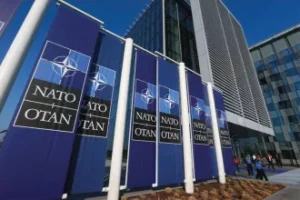Risks of PH overreliance on US defense and economic support
THE upcoming United States trade mission to the Philippines, scheduled for March 11-12, 2024, will be led by US Commerce Secretary Gina Raimondo. This trade mission is part of a broader effort to strengthen US-Philippines economic ties by enhancing further US companies’ potential contributions to the Philippine economy, connective infrastructure, clean energy transition and critical mining. US President Joe Biden has described this mission as a “first-of-its-kind” initiative, further enhancing economic and strategic cooperation between the two countries.
This mission is considered the US’ marquee and gazebo commercial event, trying to underscore the strategic importance of the Philippines to the United States, not just in the military and defense sector but even in economics.
Note that the bilateral relationship between Manila and Washington has significantly strengthened under President Ferdinand Marcos Jr., especially in defense and military matters. Marcos has expanded American troops’ access to Philippine military bases. The Philippines has also hosted the largest joint Philippine-US military exercise and seemingly will continue to do so under Marcos’ administration.
Managing expectations
In anticipation of the forthcoming US trade mission to the Philippines, there’s a glimmer of hope and a sense of optimism regarding the potential economic benefits for the Philippines. It is hoped that the US’ investment promises will materialize following this mission. Nonetheless, there’s a cautious awareness and prudent reminder that these commitments must not merely be rhetoric but should translate into tangible outcomes. It is also essential for the Philippines to tread carefully and acknowledge the current economic landscape of the US to manage expectations effectively.
It’s imperative to recognize that the US economy is grappling with a multitude of challenges, spanning from inflationary pressures and market instability to looming recession risks. These factors inevitably influence budgetary decisions, potentially impacting allocations for foreign aid. Moreover, the US is burdened by a staggering national debt and budget deficits. This elevated debt burden constrains the US government’s flexibility to expand spending or official development assistance initiatives without resorting to tax hikes or further borrowing.
Note that as early as 2024, the financial condition of the US in terms of debt and budget deficit presents a significant challenge. According to the US Treasury Department, the US federal government’s public debt surpassed approximately $34 trillion for the first time, marking a new high in US fiscal history.
On the other hand, the budget deficit for fiscal year 2023 was reported to be around $1.5 trillion, with government outlays totaling approximately $6.4 trillion against revenues of about $4.8 trillion. The debt held by the public at the end of the fiscal year was around $25.8 trillion. Hence, the US is facing a complex fiscal landscape, with high levels of debt and deficit, for some time now.
On a positive note, despite concerns about a recession, the US economy has shown some resilience. According to Goldman Sachs, the US economy is forecast to expand by 2.1 percent in 2024, outperforming consensus expectations of a 1-percent growth rate. This outlook suggests a lower probability of a US recession than is commonly anticipated.
However, the global economic landscape, including the US’ role, faces several risks that could impact its economic performance and, by extension, its international engagements, including military financing. The ongoing Ukraine crisis, the Israel-Palestinian conflict and the Yemen issue have various impacts on the US’ challenging financial and economic situation. Each of these conflicts affects the US economy and, by extension, the global economy. These geopolitical tensions and the potential further escalation of these conflicts present considerable uncertainty that could influence the US’ economic resilience and capacity to support overseas military operations and economic promises to countries like the Philippines.
Implications
The upcoming US trade mission to the Philippines is no doubt an attempt to reinforce the economic ties between the two countries, complementing the already strengthened defense and military cooperation between the Philippines and the US. Nevertheless, this mission can have various implications for the Philippines’ independence and sovereignty, especially considering the country’s historical and ongoing military and defense dependency on the US.
Note that agreements such as the Enhanced Defense Cooperation Agreement, the Visiting Forces Agreement and the Mutual Defense Treaty have not only cemented the US military presence and influence in the Philippines but also, most importantly, exemplified the Philippines’ dependence on the US in the military and defense sector. While these agreements are perceived to provide security assurances, they also place the Philippines within the sphere of US influence, maintaining a level of control that some argue undermines the country’s sovereignty and independence.
Thus, looking at the broader implications, Filipinos must be cognizant of the potential consequences of the US fostering overdependence and excessive reliance within the Philippines. This extends beyond military and defense collaboration to encompass economic ties, raising the specter of potentially further jeopardizing and compromising Philippine autonomy, independence and sovereignty. The prospect of such entanglement is unsettling. If the Philippines continues to lean heavily on the US for military and economic support, it could trigger a cascade of complex implications, including not only military dependence but economic dependence, which could make the Philippines vulnerable to economic pressures and policy dictates from the US, potentially impacting local industries and economic sovereignty, independence and autonomy.
The potential overdependence and overreliance on a single country’s military and economic support, in terms of long-term sustainability, is very risky. Economic and military dependence can translate into political dependence and reliance, compromising the country’s ability to pursue an independent foreign policy and economic development path.
Conclusion
While the upcoming US trade mission to the Philippines may strengthen economic ties and potentially benefit the Philippine economy, it also highlights the complexities of the Philippine-US relations. The country’s long history of US colonization and influence in its economic and military sectors challenges its pursuit of greater independence and sovereignty. It begs questions about the future directions of its foreign policy both on the military and economic fronts.
Moreover, suppose the country is to navigate the shifting dynamics of global power structures effectively. In that case, it needs to diversify its economic partnerships and military-defense cooperation and recalibrate its ties with the US, suggesting a move toward neutrality, nonaligned, or a more balanced approach to engaging with the US and other global powers like Russia and China.
Diversification allows a country to maintain a more independent foreign policy. In regions like the Asia-Pacific, where power dynamics are sensitive, not aligning too closely with one country can help maintain a balance of power, reducing the likelihood of conflicts. Likewise, a diversified economic partnership helps in creating a stable economy. In defense, diversified military partnerships can also ensure that a country is not overly reliant on a single source for military hardware, training or intelligence, which could be critical in geopolitical shifts or supply chain disruptions.
Indeed, diversified partnerships in the military/defense and economic fronts enhance a country’s security and economic resilience. But the most critical thing for the Philippines is to have a more sustainable long-term strategy, and that’s to build self-reliance in defense, military and the economy.



